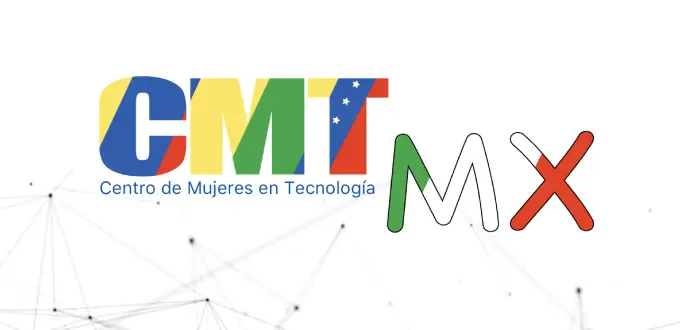United for Gender Equality
30/09/2019

Conversations held during the LACNIC 31 event in Punta Cana led Carmen Denis (Mexico), Nathalia Sautchuk (Brazil), Paola Pérez (Venezuela) and Erika Vega (Colombia) to begin working on the creation of the Mx Center for Women in Technology (CMTMx).
Seeking to encourage greater female participation in the word of Information Technologies —particularly in the region and in their own countries— this project promotes the development of young women in all areas related to the Internet.
The initiative has just been awarded a grant by LACNIC’s FRIDA Program so that the project can broaden its scope and reach a greater number of women.
In an interview with LACNIC News, Carmen Denis, one of the founders of the project, shared details about the initiative.
How did the proposal for the creation of the Center for Women in Technology (CMTMx) originate and what prompted you to move forward with this initiative?
After our conversation, we identified the need for greater participation of women in Internet-related issues in each of our countries and at the regional level. We also identified the opportunity to begin our work in Mexico, specifically in the city of Mérida, Yucatán, where IXP Yucatán, a project for Internet development has already been implemented.
In its initial stage, the project will focus on training female university students and on offering the help of expert mentors to involve them in Internet infrastructure development, while at the same time providing them with the tools they need for their own professional development.
The project is supported by the National Association of Universities and Higher Education Institutions (ANUIES) and the Secretariat for Innovation, Research and Higher Education Institutions of the Yucatán State Government.
We firmly believe that “education is the pillar of society” and that helping individuals in their development also fortifies the community.
What have been the project’s main lines of action?
The Mx Center for Women in Technology was created with a clear and sustainable vision, according to which the women and girls of Yucatán can not only develop, access and use ICTs effectively in their learning, but they can also develop their entrepreneurship skills, work on activities in their professional field, and in turn offer this opportunity to future generations.
The project has two main lines of action. The first consists of developing new talent for Internet development and involves the creation of a group of 10 women who are studying ICT careers at the universities of Mérida who, for six months, will receive training to help them develop their digital skills in Internet resources, network management, security, IPv6, and basic and advanced routing. The young interns will contribute to and participate in the deployment of Internet infrastructure at the facilities connected to the IXP node in the state of Yucatán.
The women who excel at this stage will then attend the LACNIC On The Move or LACNIC 33 events so that they can become involved with the community.
The project’s second line of action is Bootcamp CMTMx. This experience comprises a full week of activities and workshops for fifteen girls and teenagers who will be encouraged to participate in the development of mobile apps, computer architecture, robotics and networking. The project will seek the collaboration of diferent partners (private sector, civil society, the technical community) as well as that of academic networks (CUDI and Red CLARA).

Why do you think that the world of ICTs has so far been dominated by male presence?
We were surprised by the fact that the number of women enrolling in careers in this field is much lower than the number of men (15.08% vs. 84.92%) and that the gender divide continues to increase. Therefore, we believe that this male domination is the result of a lack of interest among women in entering the world of STEM.
In the current job market, underrepresentation of diverse identities not only implies inequality, it also means that the demand for labor is greater than the supply. Given that technology is one of the main industries providing employment to millions of people around the world, the creation of jobs without gender discrimination becomes a necessity. If women were to study this type of careers at a larger scale, it would be easier to cover the deficit. This is the rationale behind Bootcamp CMTMx, the line of action intended to motivate girls and adolescents to take an interest in careers in technology.
As mentioned earlier, in its initial phase the project focuses on women with the goal of promoting equal opportunities and encouraging women who wish to stand out. In turn, preparing women to become critical citizens, responsible women with values, who know how to make decisions and who wish to contribute to society will increase the support for the goals of our project.
How do you value your participation in LACNIC’s FRIDA Program? Do you think that the FRIDA Grant will help you secure additional support for the project?
FRIDA has undoubtedly provided us with a great opportunity to include more women like ourselves in the area. So far, we have received all the support and guidance we need to build and optimize our project. Several partners have expressed their interest and believe the project is brilliant idea. We are certain that this is just the beginning and our intention is that it will become a sustainable project for all the countries of the region.
We conclude with a sincere thank you to LACNIC. As professional women and as part of the community, we are committed to adding value to the essence of their mission by building capacity among the regional community through training, cooperation and collaboration with other entities; promoting equal opportunities and encouraging young people —both women and men— to develop their skills in Internet development and encourage community engagement.
(Free access, no subscription required)